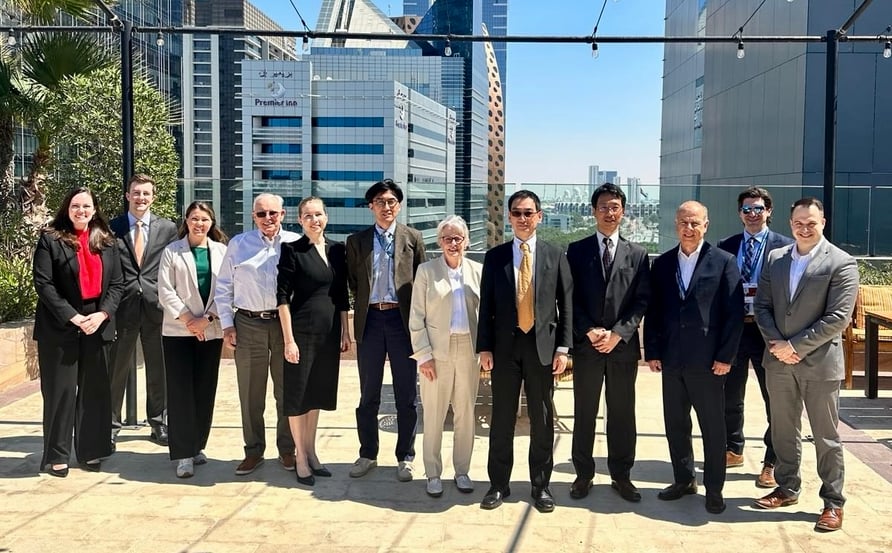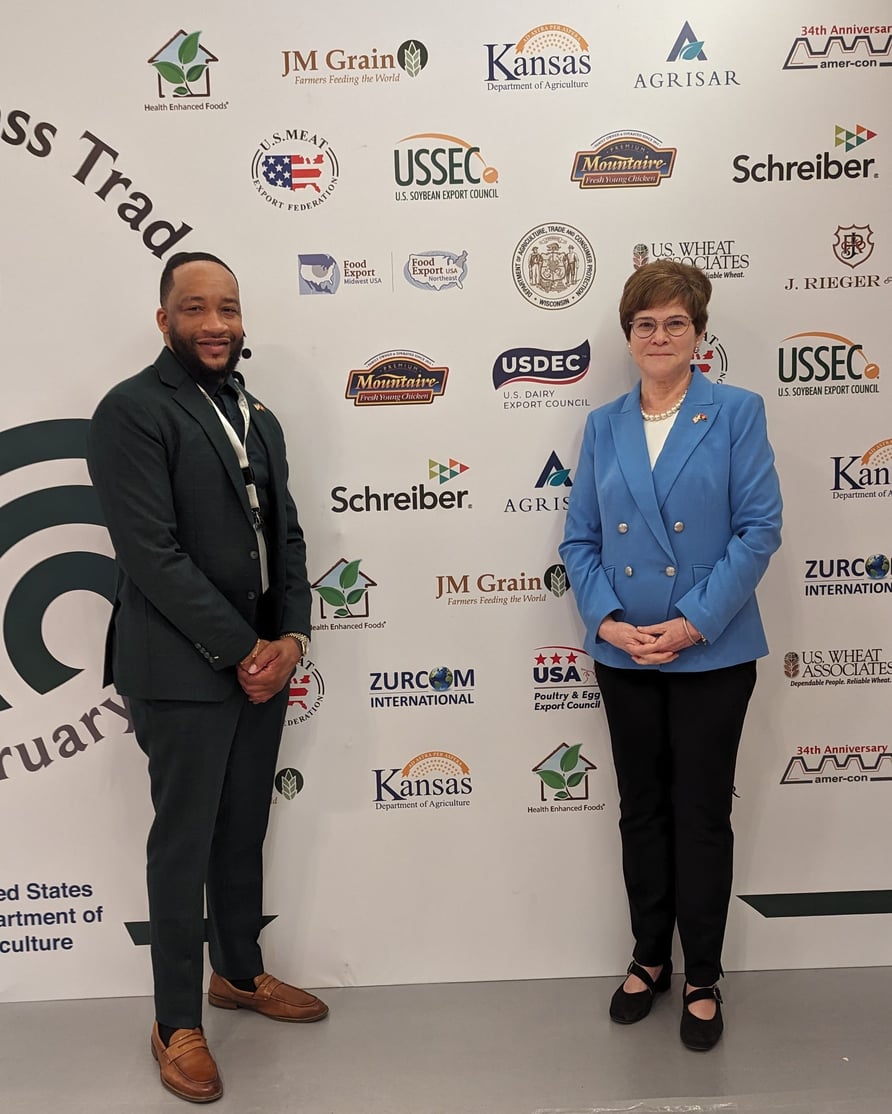HIGHLIGHTS: MARCH 1, 2024
• Dairy priorities at MC13
• House letter reiterates need to boost U.S. ag competitiveness
• Ag Trade Caucus calls for greater market access
• FMC sets rules on detention and demurrage billing
• Harden explores dairy export opportunities in Angola
• MARA team in Malaysia
• Deadline approaches for discount hotel rate for Membership Meeting
• Market Summary: Year-end International Demand Analysis
• Protests cause EU to back down from some new farm regs
• Member download! LX Pantos market intelligence report
• Danone finds buyer for Russian assets
• Corporate report roundup: A2, Nestlé, Danone, Kerry, FrieslandCampina
• Company news: F&N, Arla, Bega
Featured
USDEC argues for dairy trade priorities at WTO’s MC13
USDEC’s Jaime Castaneda and Tony Rice defended U.S. dairy priorities this week in Abu Dhabi at the WTO’s 13th Ministerial Conference (MC13). USDEC advocated for pro-dairy trade policies and against proposals that would weaken disciplines of the WTO in meetings throughout the conference, which ran from Feb. 26-29.
As noted in a joint USDEC/NMPF press release on MC13, there is the concern that a small group of countries will attempt to extract concessions on one issue by withholding support on other broadly supported provisions. While it is evident that most countries do not want the WTO to take a step backward, a select few members are leveraging unrelated issues to advance proposals that would expand agricultural trade-distorting measures like public stockholding. USDEC and NMPF strongly support the U.S. government’s leadership in standing firm against any attempts to weaken trade disciplines.
As part of the U.S. Coalition for WTO Reform, USDEC advised U.S. government negotiators, met with the WTO Secretariat and like-minded delegations, and persistently voiced U.S. dairy and agriculture priorities. Key coalition recommendations included calls for:
- Negotiations to reform the dispute settlement system.
- Establishment of a work plan on agriculture that includes market access as a priority.
- Push back against attempts to weaken WTO rules related to public stockholding subsidies and special safeguard mechanisms that would distort trade.

The U.S. agriculture industry delegation, including Castaneda and Rice, alongside the Japanese negotiating team in Abu Dhabi.

The U.S. Agriculture Coalition with USTR Chief Ag Negotiator Doug McKalip (third from left) in Abu Dhabi.
Castaneda elaborated on many of those topics during an event organized by the U.S. Chamber of Commerce before WTO stakeholders and international press.
The two-stage WTO dispute settlement mechanism essentially has been hobbled since 2019 when the Appellate Body (the second stage of settlement) lost its three-member quorum and no new members were appointed.
“The absence of a functioning Appellate Body undermines the enforcement of trade rules and resolutions of disputes, particularly at a time when the global trade landscape continues to become increasingly fragmented,” Castaneda said. “We call upon WTO members to prioritize reestablishing a fully functional dispute settlement system.”
Castaneda also outlined U.S. dairy’s sustainability leadership and how those efforts align with the need to nourish a growing global population. The United States welcomes a narrative related to sustainability and trade, “particularly given the dairy industry’s unique ability to provide nutrient-dense products to the world while reducing its environmental impact. Approaches to sustainability in agriculture are not a one-size-fits-all model, and as such, we strongly oppose any outcomes that permit the development of new nontariff barriers disguised as sustainability measures.”
During the trip, Castaneda and Rice also met with USDEC international staff to get the latest updates on trade barriers in the Middle East and North Africa region.

Castaneda (back, right) speaking at a U.S. Chamber of Commerce-organized event on dairy business priorities at the WTO.
House letter reiterates need for government action to boost U.S. ag trade competitiveness
A bipartisan group of 22 House members sent a letter to USTR Katherine Tai and USDA Secretary Tom Vilsack expressing concerns about the mushrooming U.S. agricultural trade deficit and urging action to reverse the trend. Reps. Max Miller (R-OH), Angie Craig (D-MN), John Duarte (R-CA) and Randy Feenstra (R-IA) led the letter; USDEC and NMPF provided input during its drafting and helped to gather signatures.
It echoes a letter sent Feb. 15 by a coalition of 20 U.S. agricultural organizations, including USDEC and NMPF, to members of Congress urging them to take steps to assess U.S. agricultural trade competitiveness in light of the growing ag trade deficit (see Global Dairy eBrief, 2/23/24).
The House letter cites a proposal made last year by the President’s Export Council (see Global Dairy eBrief, 12/1/23) that provided recommendations for the administration to expand export market opportunities for U.S. food and agriculture, eliminate unwarranted nontariff trade barriers and reinforce global food security.
Both the House letter and proposal from the President’s Export Council call for:
- Eliminating tariff and non-tariff trade barriers to enhance the ability of American producers to gain export market access and recommitting to comprehensive trade agreements.
- Continuing work to preserve the full value of existing U.S. free trade agreements including efforts on the U.S. Mexico Canada Agreement.
- Taking steps to reform the WTO dispute resolution process to increase market access for U.S. agriculture goods and effectively hold U.S. trade partners accountable to trading commitments.
“We urge your strong support and swift action to bolster U.S. food and agriculture trade opportunities and expand market access for farmers and ranchers in new and key markets,” the letter concludes.
Ag Trade Caucus letter calls for action on new market access opportunities
Twenty-eight members of the bipartisan Agricultural Trade Caucus sent a joint letter to USTR Katherine Tai and USDA Secretary Tom Vilsack urging the administration to make agriculture a priority in its trade agenda by reducing tariffs and non-tariff barriers for U.S. agricultural suppliers. The U.S. needs to proactively engage and secure enforceable, high-standard agreements with our trading partners that ensure U.S. farmers and ranchers can compete globally on a level playing field, the Caucus said.
USDEC helped build support for the letter, which continues the recent drumbeat of calls to improve the U.S. competitive position in international agricultural trade (see story above).
The Caucus urged Ambassador Tai and Secretary Vilsack to address several dairy priority issues, including continuing to challenge Canada’s dairy tariff-rate quota allocation system; ensuring that sanitary and phytosanitary (SPS) regulations are science-based, transparent and consistent; and combatting the EU’s abuse of geographical indications to monopolize markets.
The letter emphasizes the tariff advantages U.S. competitors are amassing through bilateral and regional trade agreements while the U.S. sits on the sidelines.
“Maintaining the status quo will only put American agriculture further and further behind as our competitors aggressively pursue such opportunities,” the letter concludes.
FMC final detention and demurrage rule a positive step
On Feb. 23, the Federal Maritime Commission (FMC) published its final rule on detention and demurrage billing practices. The rule, which is part of Ocean Shipping Reform Act (OSRA) implementation, is a positive development for U.S. suppliers who have faced improper detention charges, particularly during the supply chain crisis of 2021-2023. While unfair detention and demurrage charges improved as the supply chain crisis eased, the new rule should help limit issues moving forward.
USDEC was an ardent supporter of OSRA, including provisions to halt unfair detention and demurrage charges, and worked strongly for its passage. The organization filed comments backing the draft detention and demurrage rules in December 2022, suggesting some refinements to clarify the provisions. The final rule largely aligns with those comments on key matters, such as providing clarity on who should be billed, the timeframes for billing and the dispute process.
The rules will go into effect on May 26, except for certain invoice information requirements that still must be approved by the Office of Management and Budget.
Harden explores African potential on USDA Angola mission
USDEC President and CEO Krysta Harden is in Africa this week for two events: the first-ever USDA trade mission to Angola and the UN Environmental Assembly (UNEA) in Kenya. On the first leg of the journey, Harden met with the Angola Minister of Agriculture, the U.S. ambassador to Angola and potential buyers to initiate relationships and gauge U.S. dairy export potential in the region. FAS staff and trade experts provided in-depth market briefings.
USDA Deputy Secretary Xochitl Torres Small led the mission, which included representatives from the Wisconsin and Kansas Departments of Agriculture and more than a dozen other U.S. food and agriculture companies and organizations. Attendees included Quintin Jones, business development director, APMEA, Schreiber Foods.
With a young population, a solid and reliable economic base, and an increasing desire to strengthen economic ties with the U.S., Angola presents attractive long-term opportunities for U.S. agricultural trade, including dairy.
Watch next week’s Global Dairy eBrief for more on the Kenya leg of the trip.

Quintin Jones, business development director, Schreiber Foods, and Krysta Harden, USDEC President and CEO, at this week’s USDA trade mission to Angola.
USDEC continues positive engagement in Southeast Asia
This week, USDEC’s Market Access and Regulatory Affairs (MARA) team continued its outreach activities in Southeast Asia, meeting with government officials from Malaysia. A meeting with Dr. Sabariah binti Ismail, deputy director, Head of the Import/ Export Services Section Department of Veterinary Services (DVS) Malaysia, clarified the document requirements of the current plant registration process. Jonathan Gardner, MARA senior vice president, led discussions on the U.S. dairy safety program and how it ensures the safety of U.S. milk and exported dairy products.
The group also met with Ms. Norhidayah binti Othman, senior assistant director, Import Division of Food Safety Quality Department (FSQD), Ministry of Health, to discuss labeling requirements and container inspections at ports of entry.

Left to right: USDEC MARA team members Aimee Pinkerton and Jonathan Gardner, Malaysian veterinary official Dr. Sabariah binti Ismail, and USDEC Southeast Asia office MARA manager Lee Su Yong.
Events
Don’t miss out on discount hotel rate for USDEC Annual Membership Meeting
While the USDEC Annual Membership Meeting won't take place until April 15-17, the deadline to reserve a hotel room at the discount rate is coming up quickly. Please click here by March 22 to get to the Omni Houston Hotel reservation page and reserve a room at the special USDEC rate. If you have issues booking a room, please contact Louise Kamali at lkamali@usdec.org.
The meeting will be stacked with informative sessions featuring a lineup of dairy export experts, including a session on the challenges and opportunities in Latin America. U.S. dairy export growth to the region has been strong in recent years, with multiple records set in 2023. USDEC Vice President, Global Economic Affairs will lead a panel including Rodrigo Fernandez, USDEC Mexico office leader, and Monica Ganley, senior director of Global Trade Analysis, as they explore where they see demand and U.S. dairy exports going in the years ahead to Mexico, South and Central America, and the Caribbean.
For information on the full slate of activities on tap at the Membership meeting, download a preliminary agenda here.
Market Summary
Dairy trade declines 0.1% for the year; USDEC year-end International Demand Analysis ready for download
Global dairy trade fell 0.1% in 2023 in milk solids equivalent (MSE) terms, according to the latest USDEC International Demand Analysis, which features December and full-year data and analysis. It was a lackluster end to 2023, with year-over-year declines from all three major suppliers. U.S. MSE volume fell 5.3% in December, New Zealand dropped 5.2% and the EU slipped 1.3%.
Improved demand from Southeast Asia in the fourth quarter and moves by China to boost its economy (and subsequently demand) create some optimism in 2024, particularly if Latin America and the Middle East/North Africa can build on their strong 2023 buying patterns. But headwinds are plentiful, and a meaningful Chinese dairy import demand recovery will still take time to develop.
Overall, global dairy demand is running sideways and is expected to continue doing so through the first half of 2024. For the complete analysis, download the report here.
The International Demand Analysis is packed with charts, graphs and commentary, providing members with a forward-looking glimpse at world markets from a U.S. exporter’s point of view. The report analyzes demand in the key markets for cheese, NFDM/SMP, whey (HS Code 0404.10) and WPC80+, and also includes shorter summaries for lactose, butterfat and WMP. For questions and comments, please reach out to William Loux (wloux@usdec.org) or Stephen Cain (scain@nmpf.org).
European Commission announces simplification proposals as farmer protests continue
Farmers in Prague, Madrid and Poland joined demonstrators in nearly 10 EU countries as farmers continue to protest the growing burdens from environmental regulations, subsidy cuts and unfair competition from cheap imports. In France, farmers intercepted a Lactalis tanker truck containing roughly 20,000 liters of milk, emptied its contents and redistributed it to others in the region to protest the “low purchase price” of milk by the French dairy company.
In response, the EU has already relaxed some of its Green Deal environmental policies, including removing a goal to cut farming emissions from its 2040 climate roadmap. Last week, the European Commission added the proposal of some simplification measures to its Common Agriculture Policy to reduce the administrative burdens on EU farmers. These proposals include simplifying some of the agricultural and environmental condition requirements with which EU farmers need to comply; simplifying the methodology for certain checks (aiming to reduce the number of on-farm visits by national administrations by up to 50%); and clarifying the use of the concept of force majeure (acts of God) and exceptional circumstances.
In a statement, European Commission President Ursula von der Leyen said, “The Commission remains fully committed to delivering solutions to ease the pressure currently felt by our hard-working farming women and men.”
At this stage, despite some softening of regulations that were expected to restrain EU milk production growth moving forward, USDEC does not anticipate a material increase in EU dairy capacity. (Bloomberg, 2/22/24; Reuters, 2/26/24)
Supply Chain
LX Pantos makes Market Intelligence report available to USDEC members
Global logistics company LX Pantos has released its first-quarter Market Intelligence Report to USDEC members. The report outlines considerations for 2024, supply/demand fundamentals, operational risks, carrier alliance updates and other supply chain insights. In a nutshell, the company believes oversupply is likely to prevent significant rate increases. However, carriers’ efforts to defend rates should limit price declines. In addition, markets remain volatile and subject to disruption, keeping open the possibility of potential spikes. Download the 17-page report here.
Company News
Danone to sell operations seized by Russia
France’s Danone plans to sell its Russian business to a member of its government-installed management team for 17.7 billion rubles (about US$192 million). The move comes after Danone’s local operations were seized by the Russian government last July in retaliation against foreign sanctions imposed in response to its 2022 invasion of Ukraine. Danone initially said it would stay in the region after the war began but decided to seek a buyer after seeing financial performance decline. The deal, which is reportedly priced at 56% less than market value, must be approved by Russia’s Ministry of Agriculture and a special subcommittee that rules on the exits of Western companies. (Reuters, 2/21/24; Financial Times, 2/21/24)
Corporate report recap
Persistently high inflation interfered with sales at many major global dairy processors in 2023, as companies noted in their most recent financial performance results.
- China driving results for a2 Milk Co. New Zealand-based infant formula company a2 Milk Co. reported that revenue was up 3.7% and net profit after tax was up 15.6% in its 2024 half-year results. The company’s report cites strong performance in the Chinese market, which accounts for roughly 80% of its branded sales, for the gains. Despite fewer births and higher costs associated with meeting China’s new national standards for infant formulas, a2 posted total IMF sales growth of 1.5% and launched a new China-labeled IMF product. However, while announcing improved revenue guidance, the company also warned that “China IMF market conditions remain challenging with a double-digit decline in market value still expected in FY24.”
- Dairy Ireland weighs on Kerry Group results. Kerry Group 2023 revenues fell by 8.6% to €8.020 billion (about US$8.7 billion) while profit after tax increased to €728.1m (about US$787.4 million). Part of the revenue drop was attributed to falling sales and volumes in the Dairy Ireland unit. Revenue and overall EBITDA in Dairy Ireland dropped due to constrained supply conditions as well as elevated input costs impacting market demand dynamics. Chief executive Edmond Scanlon said the company would continue to “selectively invest” in the dairy business. It sees emerging markets, sustainable nutrition and foodservice as its key business differentiators.
- “Difficult year” for FrieslandCampina. Netherlands-based FrieslandCampina’s revenue dropped by 7.1% in 2023 to €13 billion (about US$14 billion), a decrease the company attributed to unfavorable currency translation effects, the sale of part of its German consumer activities and declining volumes in consumer markets due to high inflation. The co-op’s operating profit tumbled 84.1% last year to €75 million, a drop linked to discrepancies between the guaranteed price of member milk and dairy commodity market prices. CEO Jan Derck van Karnebeek said, “2023 was a difficult year for FrieslandCampina,” and the company is not providing a supplementary cash payment to its member dairy farmers. FrieslandCampina expects worldwide demand for dairy to grow slightly in 2024, but said ongoing conflicts and geopolitical instability in various parts of the world will likely increase costs for raw materials, packaging materials and transportation.
- Strong results for Danone. France-based Danone reported that revenues rose 7% in 2023 to €27.6 million (about US$30 million), a jump attributed to a 7.4% increase in prices. The essential dairy and plant-based protein (EDP) business was credited as a key driver of Danone's success, delivering positive results with volume/mix returning to positive territory. China, North Asia and Oceania also experienced competitive growth. CEO Antoine de Saint-Affrique said 2023 was a year of consistent progress and strong delivery against the company’s Renew Danone agenda. “In a context which remains challenging, the progressive improvement of our volume-mix, turning positive in Q4, the visible progress made by EDP Europe, and the continued strong momentum of our Medical Nutrition activity are encouraging signs, even if lots remains to be done,” he said. This year, the company expects inflation to ease and like-for-like sales growth in the 3% to 5% range.
- Dairy and Infant Nutrition grow for Nestlé. In the Swiss food and beverage giant’s full-year 2023 results, total reported sales decreased 1.5% to CHF93 billion (about US$106 billion), a drop the company attributed to foreign exchange fluctuations and net divestitures. Two of the brighter spots were in Infant Nutrition and dairy. Infant nutrition posted high single-digit growth, based on continued momentum for premium infant formula, including human milk oligosaccharides products and specialty formulas. Dairy reported mid-single-digit growth, led by fortified milks, coffee creamers and home-baking products. Dairy sales in Latin America were solid, with high single-digit growth supported by dairy culinary solutions and fortified milks. Infant Nutrition saw high single-digit growth in Latin America and positive growth in Greater China. Sales of healthy aging products grew at a double-digit rate in China, supported by the launch of the company’s N3 milk. CEO Mark Schneider cited increased marketing and other investments for the company’s growth in the face of unprecedented inflation that impacted consumer demand for food and beverage products. Nestlé expects organic sales growth of around 4% in 2024 and a moderate increase in operating profit margin. (Company reports)
Fraser & Neave plans dairy manufacturing facility in Cambodia
Fraser & Neave Holdings, the Malaysian unit of Singapore-based Fraser and Neave Ltd., announced plans to lease a 350,000-sq.-ft. industrial land parcel in Cambodia for a new dairy manufacturing facility. A new subsidiary, Fraser & Neave Foods (Cambodia), will operate the facility, which will produce sweetened beverage creamer in cans and pouches. According to a company report, the 50-year lease aims to help strengthen the company’s presence in Cambodia. The facility, which is expected to cost US$38 million to develop, is slated to open in early 2026. (Company reports)
Arla closing cheese factory in Denmark
Denmark-based Arla Foods announced that in 2025 it will close its Tistrupt dairy factory and transfer “the majority” of its cheese production to its facility in Taulov, about 80 kilometers away. The company said the Tistrupt facility, which will shut down in 2026, would require “significant investments” to meet future safety, health and quality standards. (Just Food, 2/22/24)
Company Briefs
Australia-based Bega Cheese said it will close its Betta Milk and Pyengana Dairy plant in Burnie, Tasmania, and move production of those brands to one of its other Tasmanian facilities. A company statement cited the inability of the site to function in a commercially sustainable way, calling it “an aging facility that has a number of challenges including its safety and environmental impacts.” … Unilever’s Breyers brand and California-based precision fermentation supplier Perfect Day announced a partnership to launch a new Breyers lactose-free chocolate frozen dessert made with Perfect Day’s dairy protein from fermentation. U.K.-based Unilever is the first multinational ice cream and frozen dessert brand to offer a product with Perfect Day’s whey protein from fermentation. (Company reports; Just Food, 2/20/24)
In Case You Missed It...
U.S. Dairy Exporter Blog
Market analysis, research and news subscribe hereUSDEC Twitter feed
Follow us here.